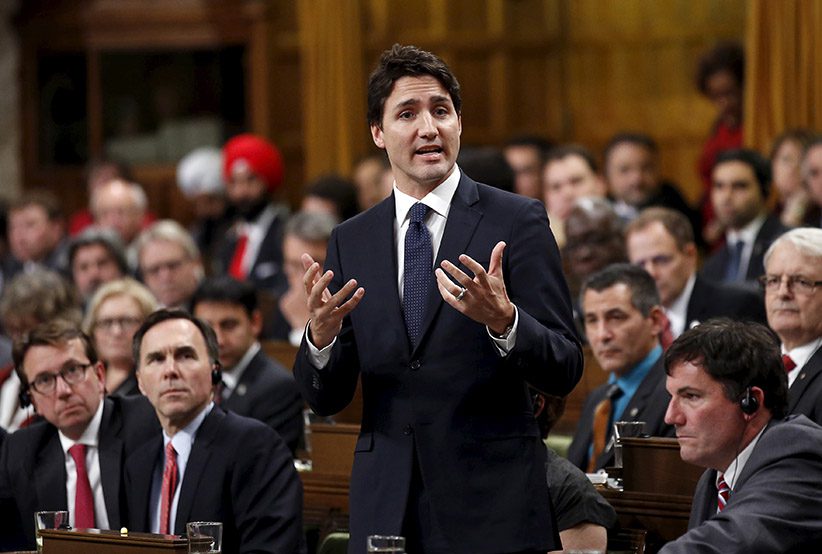Ah, but what to make of this Liberal government?
When Justin Trudeau became prime minister, it seemed more than enough that his sunny ways existed. A welcome breath of fresh air from the dour utilitarian, the sentient economics textbook, he was replacing.
The promises seemed pretty solid, too.
Greater transparency, unmuzzled scientists, electoral reform, and on and on. These weren't promises made on pure policy grounds, either. They were explicitly set out as a rebuke to the governing style and substance of Stephen Harper's Conservatives.
The deal was pretty straightforward: Elect us, and we'll be different.
They've certainly kept the style half of their promises. Barely a day goes by without some cheery announcement from a minister or the big man himself that's heavy on the doe-eyed sentimentalism. It's getting to the point that I'm starting to wonder if this may be a key part of the emerging Trudeau legacy: lofty rhetoric unmoored from actual deeds.
Looking at this week's access to information legislation overhaul and the you'll see an example of the rhetoric far outpacing the action contained within the law.
As VICE features editor Justin Ling pointed out, the changes to the law don't really codify anything. The promise was that the Prime Minister's Office, and the offices of ministers, would be covered under the act. In theory, this would mean that a journalist, lawyer, or whoever would be able to make a formal request for documents from the PMO or cabinet office. Right now, those are all exempt from the law.
But, instead of just adding those offices under the access umbrella, the Liberal's did a nifty trick where they codified that those offices would release information through "proactive disclosure."
According to Ling's report, Treasury Board President Scott Brison told reporters, "We are fulfilling our mandate commitment—we are extending the Access to Information Act to ministers' offices and to the Prime Minister's Office for the first time ever."
And that, dear reader, is what's known as bullshit.
It gives the veneer of transparency, because here they are releasing documents out of their own generosity. Look how great they are, how proactive! But it's not hard to see how this system of self-directed openness could be subverted. Instead of being compelled by law to release things that they're asked to make public, they'd instead get to pick and choose what to publish.
In this case, the proposal is to release documents like question period talking points and the titles—not the full documents, mind, just the titles—of briefing notes to ministers.
The goods, the real grease that keeps the gears of government churning away, that stuff will still stay secret, still out of reach from you or I. The real advice and deliberation inside the executive will be left instead for historians to puzzle through decades down the road.
Now, credit where it's due. The government has set out on a reasonably ambitious course to tackling climate change. Getting a carbon tax set into law is not going to be an easy task, and they seem willing to follow though. And while legalized cannabis is likely going to turn into a puritan red-tape nightmare, it looks like that will happen, too.
But there seems to be an ever-widening gulf between the government's rhetoric and what it does. Trudeau campaigns on a platform of respect for Parliament and debate, then his government tries to rewrite the rules to limit debate as though Parliament was a nuisance standing in the way of progress.
In the same vein, the attempted appointment of Madeleine Meilleur to be the official languages commissioner was breathtaking for its gall. Here was a candidate deemed too partisan — by Meilleur's own admission! — for the Senate, but perfectly suitable as an independent officer of Parliament. Meilleur would have to withdraw herself from consideration, when it became clear to the government what was obvious to everyone else.
And let's not forget the big show of freeing scientists and other civil servants from the shackles of Harper's relentless message control, the government opted instead to add leg irons to the bureaucratic media kit. The only difference now is they're nice about this stuff.
As National Post reporter Tristin Hopper found out, simple factual questions can't be answered without the intervention of the media department. As an anonymous federal employee emailed him, "No problem — you have some interesting questions there that I hope I can discuss with you — but I'm not optimistic that they will. We're in a far more intense period of message control than we ever experienced under the Harper regime."
Again and again on issues of transparency and good governance, the Liberals say the right things, then act in complete opposition to those. When faced with a situation where they could either open up the workings of the government to the public, or tighten their grip on the message, they opt to tighten their grip.
Through the sheer force of their positivity they've been able to skate past many of their broken promises and cynical compromises now that they hold the executive reins. But things can't go on like this forever.
A balloon can only hold so much hot air before it pops.






